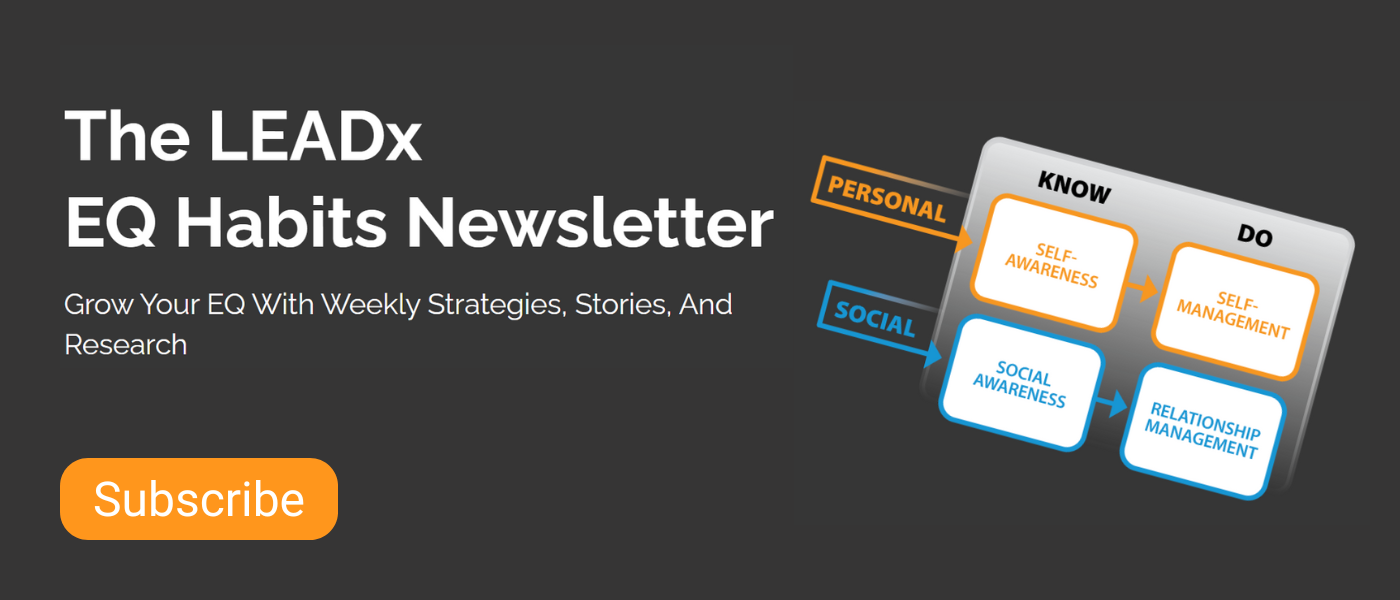
One of the greatest myths of emotional intelligence is the notion that certain emotions are inherently “good” while others are “bad.” This misconception leads people to think they should ignore or suppress “bad” emotions and only embrace “good” ones.
 But, the research shows that trying to stop yourself from feeling certain emotions is impossible. Emotions are instinctive, arising before our brain processes them. The true test of emotional intelligence then isn’t to avoid difficult emotions; it’s to learn to channel them in a productive way.
But, the research shows that trying to stop yourself from feeling certain emotions is impossible. Emotions are instinctive, arising before our brain processes them. The true test of emotional intelligence then isn’t to avoid difficult emotions; it’s to learn to channel them in a productive way.
This article will explore five real-world examples of how people have successfully used what might be considered “bad” emotions—anger, spite, and anxiety—to enhance their drive, focus and performance.
Channel Your Anger to Heighten Your Focus: From Professional Baseball Player Max Scherzer
Anger is often labeled as a “bad” emotion—one to be suppressed or controlled. But what if anger, when channeled correctly, could actually fuel your performance? Max Scherzer, one of baseball’s most intense and successful pitchers, offers a compelling example.
Nicknamed “Mad Max,” Scherzer is known for his fierce, almost feral intensity. He does things like:
- grunt & howl at hitters
- scream into his glove so no one can lip-read his obscenities
- yell “no” at his coach when trying to take him out of the game
As an 8-time All Star and 3-time Cy Young award winner, Scherzer is also known for being one of the best pitchers of his generation. When asked if he uses emotion as fuel, he responded, “You definitely can. [Anger] hits that adrenaline, so once that adrenaline hits, it almost feeds itself.” Scherzer attributes much of his success to his ability to channel his anger for focus.
Outside of baseball, a manager might use anger to signal to her team that an important boundary has been crossed (helps foster psychological safety) or to fuel her own performance (motivation). Or an activist might harness anger to express the urgency and gravity of his cause. Research supports these examples, multiple studies showing that angry participants outperform others on challenging tasks.
However, Scherzer cautions against letting your anger go unchecked. “[Anger] can also be a negative. It has been in the past, where you almost get too much adrenaline, too much emotion and you aren’t thinking clearly,” he said. The key is intent. Scherzer doesn’t just dial in anger to see what happens; he channels it for energy and focus.
Use Spite to Fuel Motivation: From Flow Researcher and Author Steven Kotler
Flow researcher and author Steven Kotler writes about how spite can be that extra nudge you need to increase your grit. Kotler’s idea here is simple. You “bulletin board” all the critics, doubters, and rejections. Then, the next time you’re feeling tired or feeling like giving up, you can turn to that board for a burst of inspiration. Author Stephen King offers an example of this strategy in action. He collected every rejection he received for his stories and nailed them to the wall. “By the time I was fourteen the nail in my wall would no longer support the weight of the rejection slips impaled upon it,” King recalled. “I replaced the nail with a spike and went on writing.”
Access Your Anxiety to Increase Your Drive: From Ira Glass Host of “This American Life”
Ira Glass, the Host and Producer of “This American Life,” relies on anxiety to propel his work. “I'm anxious about my work being good. Like all the time…I'm anxious about getting it done, and I'm anxious about it being good. I'm anxious in general,” he said in an interview with journalist Adam Moss.
But, Glass doesn't see his anxiety as a demon. He sees it as a much-needed ally. A driver, a motivator, and an accelerator. He intentionally sets a harsh deadline for each episode (knowing this will produce anxiety), and then forces himself to stick to it. “Without [deadlines] I can really float,” Glass said. “There are stories where much of the time I'm wondering, are we gonna have to kill them? And only at the 11th hour do they get to be good enough. It's only through an act of will that these things are not mediocre.”
Research confirms that Glass’s approach is a good one. A medium level of anxiety has been shown to improve performance (though performance does decline when anxiety grows too intense). Psychologist Dr. Tracy Dennis-Tiwary wrote the book Future Tense on exactly this topic—using anxiety as a tool.
Understand Your Boredom to Unlock Productivity: From Author Haruki Murakami
In 1987, Japanese author Haruki Murakami finished the first draft of his first novel, Hear the Wind Sing. “When I read the result, I was far from impressed. My book was rather boring,” he writes in his book Novelist As A Vocation.
Murakami considered giving up—both on his book and on himself as a writer. But, as he thought about his book more, he realized what was holding him back. He was trying too hard to “write something novelistic” and to “create something sophisticated.”
So, he did something interesting. He re-wrote his book in English (his first language is Japanese). With a more limited vocabulary, he wrote shorter, simpler sentences. He thrived on the challenge and found himself falling into a steady rhythm with his writing. “It was tremendously exciting,” he writes, “When I sat down at the kitchen table each night and went back to work on my novel…I felt like I was holding a new, cutting-edge tool in my hands.”
Murakami would have never tried something playful if he hadn’t spent time thinking about and understanding why he felt bored by his work. We can imagine that his thought process went something like this:
- He thought that his book was boring.
- He asked “why?” And he realized it was because his process itself was boring. He was trying to force his writing to be “novelistic” and “sophisticated.”
- He thought about how he could break that mindset. He arrived at the idea to be more playful, to mess around with language.
By taking a close look at his boredom and where it really came from, Murakami was able to foil it.
Treat Your Fear As A Sign You Should Act: From Author Steven Pressfield
In his book The War of Art, Steven Pressfield writes about the show “Inside the Actors Studio.” When the show’s host James Lipton asks actors why they chose to play a certain role, Pressfield points out how they always answer the same way: “Because I was afraid of it.” In other words, they saw their fear of a role as a signal that it offered real opportunity for growth. “The more scared we are of a work or calling, the more sure we can be that we have to do it. So if you’re paralyzed with fear, it’s a good sign. It shows you what you have to do,” Pressfield writes.
Grow Your Self-Awareness to Grow Your EQ
Each of these examples is situational and personalized to the person using it. For this reason, you shouldn’t treat these examples as copy-and-paste strategies to apply to your own life. Instead, you should treat them as a model for how to reframe your own negative emotions in a way that works for you.






